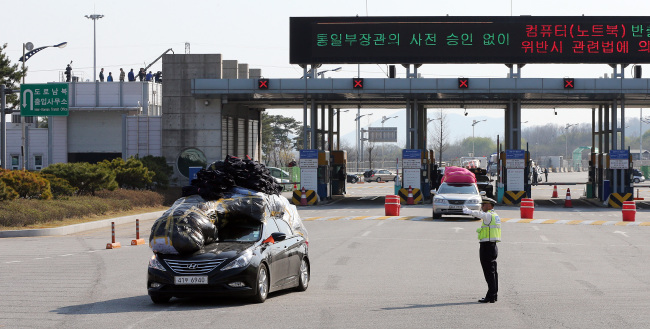Seoul focuses on safety of Gaeseong assets, compensation to firms
129 workers return home, 50 to come back Monday
By 양승진Published : April 28, 2013 - 17:19

With South Korean citizens withdrawing from the inter-Korean industrial park in Gaeseong over the weekend, the Seoul government faces a double whammy of challenges of protecting business assets from the North’s possible seizure and meeting the companies’ demand for huge compensation for the suspension.
All of the 126 workers including one Chinese returned to the South in 63 vehicles on Saturday, a day after the government decided to withdraw all South Korean citizens from the park following Pyongyang’s rejection of a proposal for talks.
The remaining 50 people managing the infrastructure will return to the South on Monday.
North Korea berated the South for the pullout on Saturday, warning that Seoul would take all responsibilities for a possible shutdown. But it did not mention if it would take measures to completely close it, apparently leaving room for negotiations.
“The fate of the Gaeseong complex is hanging in the balance. As the group of puppets (in the South) is moving in a provocative direction, its fate would face greater risks,” the Bureau for Central Guidance to the Development of the Special Zone, North Korea’s agency in charge of the park, said in a statement.
“We are closely watching whether (the South Korean leader) considers using the Gaeseong complex -- the last remaining cooperative project of our nation -- as a sacrificial victim of its confrontational policy.”
The government estimate their financial losses from the shutdown of the park would amount to around 1 trillion won ($900 million).
In the complex, which began its production activities in December 2004, the private firms have invested some 556.8 billion.
The Seoul government and public organizations invested nearly 400 billion for infrastructure such as road pavements, water and sewage systems and facilities for waste disposal and electricity transmission.
The association of the firms also appeared to have shifted its focus to compensation for the losses from normalization of the politically vulnerable park. It plans to make a request to the government for entry into the North to check on the park conditions.
“We hope to bring here the finished products from the complex,” a member of the association told media, declining to be named.
Han Jae-gweon, who leads the association, on Saturday demanded that the government craft measures for protecting finished products and raw materials at the complex and making up for losses sustained by the firms, and push for inter-Korean dialogue.
The association delayed its plan to hold a rally calling for the normalization of the industrial park on Monday. It is now calculating the firms’ total losses.
Meanwhile, Seoul’s Foreign Ministry said the U.S. fully understands and supports the country‘s decision to withdraw all of its personnel from the industrial complex.
On Saturday, U.S. Deputy Secretary of State William Burns expressed Washington’s support when he met South Korean Foreign Minister Yun Byung-se in Seoul. Burns was here on his tour of five Asian countries.
By Song Sang-ho (sshluck@heraldcorp.com)


![[AtoZ into Korean mind] Humor in Korea: Navigating the line between what's funny and not](http://res.heraldm.com/phpwas/restmb_idxmake.php?idx=644&simg=/content/image/2024/04/22/20240422050642_0.jpg&u=)
![[Exclusive] Korean military set to ban iPhones over 'security' concerns](http://res.heraldm.com/phpwas/restmb_idxmake.php?idx=644&simg=/content/image/2024/04/23/20240423050599_0.jpg&u=20240423183955)


![[Graphic News] 77% of young Koreans still financially dependent](http://res.heraldm.com/phpwas/restmb_idxmake.php?idx=644&simg=/content/image/2024/04/22/20240422050762_0.gif&u=)

![[Herald Interview] Why Toss invited hackers to penetrate its system](http://res.heraldm.com/phpwas/restmb_idxmake.php?idx=644&simg=/content/image/2024/04/22/20240422050569_0.jpg&u=20240422150649)





![[Exclusive] Korean military to ban iPhones over security issues](http://res.heraldm.com/phpwas/restmb_idxmake.php?idx=652&simg=/content/image/2024/04/23/20240423050599_0.jpg&u=20240423183955)



![[Today’s K-pop] Ateez confirms US tour details](http://res.heraldm.com/phpwas/restmb_idxmake.php?idx=642&simg=/content/image/2024/04/23/20240423050700_0.jpg&u=)